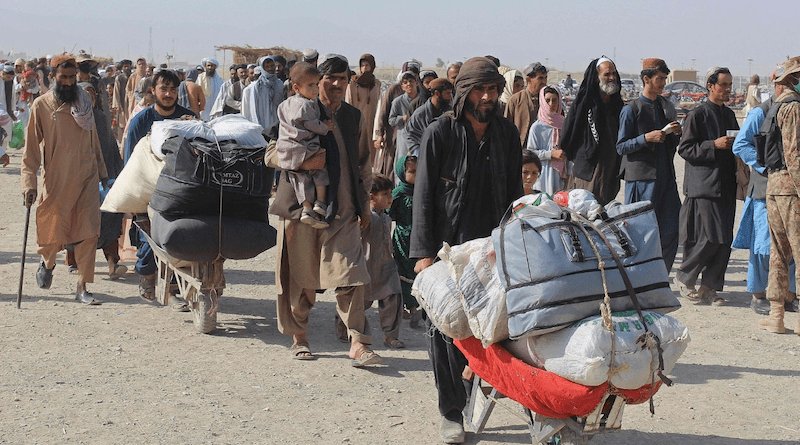Pakistan’s Unparalleled Compassion: A Haven For Afghan Refugees – OpEd
In the heart of South Asia, Pakistan stands as a testament to the spirit of compassion and humanity. For over four decades, Pakistan has welcomed and hosted millions of Afghan refugees, embodying a remarkable example of international solidarity despite not being a signatory to the UN Convention relating to the Status of Refugees. The scale of this hospitality and the positive impact it has had on the lives of Afghan refugees speaks volumes about Pakistan’s commitment to regional stability, human rights, and the values of shared humanity.
Since the Soviet invasion of Afghanistan in 1979, Pakistan has been a sanctuary for Afghan refugees, providing safety and a new beginning to those fleeing conflict and persecution. Today, Pakistan hosts around 4 million Afghan refugees, including over 1.4 million unregistered individuals and 800,000 with Afghan citizen cards. This makes it the largest refugee-hosting country globally, a fact that resonates as a tribute to Pakistan’s compassion and generosity.
The recent withdrawal of US forces from Afghanistan prompted an influx of Afghan asylum seekers into Pakistan, with nearly 150,000 individuals seeking refuge. Of these, approximately 55,000 still reside in Pakistan, reflecting the nation’s continued commitment to providing safety and security to those in need.
In a landscape of 54 Afghan refugee camps across Pakistan, a staggering 68% of Afghan refugees reside in urban areas, a reflection of the nation’s commitment to integrating refugees into the fabric of society. The remaining 32% live within these camps, relying on national public services and enjoying rights to healthcare, education, and economic activities that mirror those of citizens.
Pakistan’s role in the lives of Afghan refugees goes beyond mere hospitality. The nation’s commitment to their well-being extends to education, healthcare, and livelihood opportunities. Afghan refugees are allowed free enrollment in government primary schools, access to higher education with scholarships, and treatment in government hospitals. The inclusion of Afghan refugees in Pakistan’s national response plans to the COVID-19 pandemic underscores the nation’s determination to prioritize the health and safety of all, irrespective of their origin.
One of the most remarkable aspects of Pakistan’s refugee policy is its approach to refugees’ economic integration. Many Afghan refugees have established small businesses and contribute to the economy, not only supporting their families but also sending remittances to their loved ones across the border.
Pakistan’s commitment to positive change is evident in its compassionate initiatives. When the Afghan Embassy requested the release of Afghan citizens detained in Pakistani jails, Pakistan responded positively, releasing over 2,350 individuals. This gesture, while often overlooked, exemplifies Pakistan’s dedication to fostering goodwill and cooperation between the two nations.
In terms of border crossing points, Pakistan has taken notable steps to facilitate the movement of Afghans for medical, business, tourism, and family purposes. Introduction of an online visa regime for Afghans, managing high-volume border crossings, setting up a joint committee for cross-border movement, and improvements at various border crossing points have all streamlined travel between the two nations.
Comparing Pakistan’s approach to that of its neighbors adds further weight to its humanitarian efforts. Unlike Pakistan, countries like Iran and Turkey have imposed strict policies on Afghan asylum seekers, including area restrictions and forced repatriation.
The international community has also recognized Pakistan’s unwavering commitment. UN High Commissioner for Refugees, Filipo Grandi, hailed Pakistan’s hosting of refugees as a responsibility that has not been equitably shared. In a poignant address, UN Secretary-General Antonio Guterres lauded Pakistan’s leadership, urging the world to emulate its example in standing with refugees.
Beyond the statistics and policies lie stories of resilience and success. Many Afghan refugees who found refuge in Pakistan have risen to become successful academics, athletes, entrepreneurs, and more. Their achievements exemplify the transformative power of compassion and opportunity.
Among these success stories are Afghan women who have defied adversity to become pioneers in their fields. Dr. Silsila Sherzad, a 30-year-old consultant psychiatrist and trauma therapist, and Najiba Faiz, a well-known television host and actor, embody the indomitable spirit of Afghan women.
Pakistan’s compassion extends beyond refuge to empowerment. Through initiatives like the Refugee Affected and Hosting Areas Program (RAHA), refugees are provided with skill-enhancement programs, enabling them to secure better livelihoods for themselves and their families.
Most importantly, Pakistan’s refugee policy has created a profound connection between refugees and their host country. Many settled Afghan refugees consider Pakistan their “first home,” a sentiment reciprocated by the local populace’s warmth and friendliness.
In a world where compassion often takes a backseat to political interests, Pakistan’s model of hosting Afghan refugees stands as a beacon of hope and humanity. It’s a living testament to the power of positive actions and a blueprint that other nations could follow to make the world a better place for those in need.

